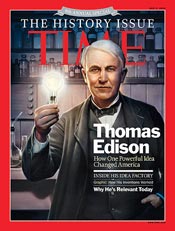The story of the growth of home schooling has been nothing short of amazing. Starting in 1985 when only about 50,000 students were home schooled, that number in the last few years has been rising about 8% per year. The US Department of Education estimated that as of 2007about 1,500,000 students were home schooled. Dr. Brian Ray, President of the National Home Education Research Institute, believes that as of the Spring of 2008, that number was over 2,000,000. There also are some very serious local benefits with home schooling as well—savings to local school construction and operating budgets, probably measured in billions of dollars. With this in mind, let’s talk about another home school success.
The world’s greatest inventor, Thomas Edison, was home schooled by his mother, Nancy Elliot Edison. After performing poorly in the traditional one-room schoolhouse of yesteryear, his mother refused to believe the teacher’s assessment that young Tom’s “brains were addled” (mentally slow). Clearly Tom was experiencing the world quite differently from his classmates, and mother Nancy knew her son had quite a bit of capability from the things he was doing and experimenting with around the house. Through a great deal of nurturing and leadership, she gave him the basic tools to learn, both in the form of process and content; and empowered him to learn.
Nancy Edison encouraged her son to have both a head and hands approach to learning, allowing him to have his own laboratory in their small basement-a place where his father became quite concerned as various small explosions emanated, along with strange smells. Nancy endured over dad’s protests and imbued Tom with four life-long pillars of learning:
- Do not be afraid to fail, keep trying, learn from your mistakes
- Read across the entire span of literature, not just what you like
- It is OK to work with your hands and learn from life, not all important things come from books
- Never stop learning, keep improving yourself.
In later years, a grown and very successful Thomas acknowledged that his mother’s discipline for a focused life was responsible for his great success. Today we hear a great deal of classroom interest in involving children in a head and hands learning environment. Renovated and new museums almost always involve head and hands exhibits or hands-on themes for learning.
Tom obviously learned differently from the standard rote learning and recitation of the day. It was fundamentally necessary for Edison to have a visceral feel for the information he was learning, especially for a need to experiment and react to the results of those experiments. Throughout his life Edison developed a love for literature and could quote many great poems and passages.
His life-long learning style motivated his strenuous recording of experiments, thoughts, and observations in thousands of detailed laboratory notebooks, which scholars are still mining today, 79 years after his death. So intense was his love of information, communications, and learning that he placed his own corporate office in his beautiful and well-stocked library. To him, a corporation was a continuous learning environment. In our Information Revolution today, symbolized by the ubiquitous Internet, Edison would be one very happy fellow!
 Many modern-day home schoolers who visit the Thomas Edison National Historical Park in West Orange, New Jersey agree whole-heartedly. Young Edison fans come to the site to see and hear first-hand the story of the great inventor, responding very well to hands-on activities at the site. A recent summer camp for young folks ages 4-11 drew many home school parents and children. As they were making wet cell batteries in response to that morning’s program, I could not help but remember Edison’s famous quote….”Fail Your Way to Success!”
Many modern-day home schoolers who visit the Thomas Edison National Historical Park in West Orange, New Jersey agree whole-heartedly. Young Edison fans come to the site to see and hear first-hand the story of the great inventor, responding very well to hands-on activities at the site. A recent summer camp for young folks ages 4-11 drew many home school parents and children. As they were making wet cell batteries in response to that morning’s program, I could not help but remember Edison’s famous quote….”Fail Your Way to Success!”

For you home school parents out there, check into our website at www.thomasedison.org where you can find lots of information about Edison and plenty of educational resources as well. Let us know what you think about Mr. Edison and the educational tools we have made available.
“To invent, you need a good imagination and a pile of junk.” ~ Thomas Edison Quote


I loved to hear about thomas Edison being homeschooled, and would like to know about other greats that have been..
is there a website that covers homeschooled greats in the 20th century-you know, where there was a choice of public education on whatever level….?
Penny
Try this site Penny:
http://www.homeschoolacademy.com/famoushomeschoolers.htm